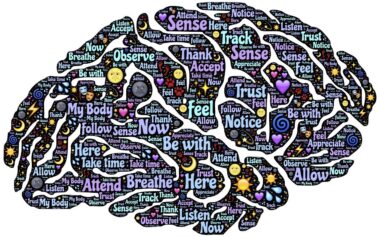Meditation Techniques for Enhancing Emotional Stability
Meditation offers various techniques to enhance emotional stability by promoting mental clarity and reducing stress. One effective method involves focused attention, where practitioners concentrate on their breath or a particular object. This helps in developing mindfulness, allowing individuals to observe their thoughts without judgment. Another technique is loving-kindness meditation, which cultivates feelings of compassion towards oneself and others. This can greatly improve emotional resilience as it strengthens connections with our own feelings and those of the people around us. Furthermore, body scan meditation allows individuals to reconnect with their physical state, aiding in the reduction of physical tension that contributes to emotional distress. By learning to recognize bodily sensations and releasing tension, one can effectively manage emotional challenges. Integrating these techniques into daily routines can foster a consistent practice that nurtures emotional well-being. Regular meditation can also aid in increasing one’s ability to handle difficult emotions and stress. By prioritizing meditation, individuals can create a sanctuary of peace within themselves, leading to more stable emotional states in their everyday lives.
For those seeking to build resilience through meditation, it is essential to establish a dedicated practice. Consistency is key; setting aside a specific time each day for meditation can enhance the mind-body connection. Start with just a few minutes daily and gradually increase the duration as comfort grows. Exploring guided meditations is also beneficial, especially for beginners. Resources like meditation apps or online videos provide structured programs that can help practitioners learn various techniques effectively. Incorporating variations like visualization can further enrich the experience. Envisioning a peaceful scene or situation can create calming emotional responses. This practice not only improves focus but also nurtures feelings of tranquility. Engaging in a community, whether physically or through online platforms, can provide motivation and shared experiences while practicing meditation. Sharing individual journeys fosters a sense of belonging and accountability. A supportive environment encourages individuals to stick to their practice. Remember that meditation is a personal journey, and it’s important to approach it with an open heart and mind. Build resilience by being kind to yourself as you develop these beautiful habits.
Mindfulness Meditation for Emotional Control
Mindfulness meditation emphasizes being present in the moment, which can significantly aid in emotional control. When practicing mindfulness, individuals learn to observe their thoughts and feelings without becoming overwhelmed by them. This skill is particularly beneficial during stressful situations, allowing persons to choose how they respond rather than reacting impulsively. Techniques such as focusing on breath help anchor the mind, providing a stable foundation amidst the chaos of emotions. Additionally, mindful movement practices like yoga can enhance emotional regulation by promoting awareness of the body and its sensations. This approach allows for a deeper connection between emotional states and physical expressions. Moreover, studies have shown that regular mindfulness practice can lead to reduced symptoms of anxiety and depression. By being present, individuals can learn to appreciate positive moments, fostering resilience against negative experiences. Creating a mindful space at home, free from distractions, can further enhance the practice. Pairing meditation with journaling can also be beneficial, as it allows for reflection on feelings and thoughts. This combination encourages understanding and ultimately helps in navigating life’s challenges with greater emotional strength.
Another effective technique to enhance emotional stability involves the practice of transcendental meditation, which allows the mind to settle into a unique state of restful awareness. This form of meditation is characterized by using a simple mantra, which helps to draw attention inward. Unlike other meditation practices, it encourages individuals to let go of all thoughts completely, entering a state of deep tranquility. Many practitioners report experiencing significant benefits, including increased creativity, improved focus, and reduced stress levels. Transcendental meditation can be practiced anywhere, making it accessible for individuals with busy schedules. Adding this to one’s routine can create profound shifts in emotional balance. Research has demonstrated its positive correlation with emotional regulation skills, helping to foster resilience towards negative thoughts and feelings. Engaging in Regular Transcendental meditation can become a life-altering habit, enhancing not just emotional stability but overall well-being. To truly experience its benefits, it is recommended to dedicate time daily, preferably twice a day. This investment in self-care is essential for anyone seeking more profound emotional control and a balanced approach to life’s ups and downs.
The Role of Meditation in Self-Reflection
Self-reflection is a crucial element in understanding and regulating emotions, and meditation significantly aids this process. Through quiet contemplation, individuals can delve into their inner thoughts and feelings to better grasp their emotional responses. Guided meditation focused on self-inquiry encourages examining the motivations behind feelings and reactions. This understanding is pivotal in recognizing patterns of behavior that may lead to emotional instability. Engaging in self-reflection through meditation fosters an environment for growth, as individuals can identify triggers and devise constructive coping strategies. Furthermore, having a deeper understanding of oneself enhances emotional intelligence, promoting better interactions with others. By observing one’s thought patterns and emotional responses, it’s possible to take proactive steps towards improving emotional resilience. Journaling thoughts after meditation sessions can also deepen self-understanding, providing insights into personal growth. Creating a safe space for honesty during self-reflection allows individuals to embrace vulnerability without fearing judgment. Meditation serves as a powerful tool for uncovering authentic feelings, leading to enhanced emotional stability and personal growth, thus enriching overall quality of life.
Incorporating meditation into a healthy lifestyle can have profound effects on emotional well-being. Regular practice nurtures a sense of peace and grounding, especially when combined with other positive habits such as exercise and a balanced diet. Engaging in physical activity releases endorphins, which naturally enhance mood and can complement meditation’s calming effects. By integrating these practices, individuals can develop a holistic approach to emotional health. Moreover, practicing gratitude during meditation can further amplify positive feelings. Reflecting on moments of gratitude helps cultivate a positive mindset, making it easier to handle obstacles. Breathing exercises within meditation sessions can also reduce instances of anxiety, promoting calmness and clarity during stressful events. Embracing challenges as opportunities for growth can shift perspectives, fostering resilience in difficult times. It is essential to create a supportive environment that encourages a healthy lifestyle overall. Moreover, embracing various forms of meditation can keep practices engaging, allowing personal preferences to dictate the experience. Ultimately, a commitment to meditation leads to long-term benefits, fostering emotional stability and enriching one’s life markedly.
Conclusion: Building Lifelong Resilience
In conclusion, meditation serves as a powerful and transformative tool for enhancing emotional stability and resilience. By incorporating various techniques such as mindfulness, transcendental meditation, and self-reflection, individuals can create a personalized meditation practice tailored to their emotional needs. Each technique offers unique benefits that can foster deeper emotional awareness and coping strategies. Developing a consistent routine cultivates resilience over time. Meditating regularly allows one to build a strong foundation for emotional well-being, reducing the impact of stressors. Moreover, creating a supportive community around meditation practices can amplify motivation and provide shared experiences for learning. Personal growth through meditation is an ongoing journey, requiring patience and dedication. The integration of meditation into an individual’s daily life enhances not only emotional stability but overall quality of life. With resilience comes the ability to navigate life’s challenges with grace and strength. Thus, embarking on a meditation journey is a worthwhile endeavor that can lead to a profound change in perspective, allowing individuals to embrace life’s ups and downs with compassion and understanding for themselves and others.
Finally, fostering emotional stability through meditation is a lifelong practice that continues to yield benefits as one evolves. Regular meditation helps individuals remain adaptable in the face of life’s uncertainties. It opens the door to new awareness and possibilities, inviting individuals to experience life with a renewed sense of purpose. Encouraging friends, family, or even colleagues to engage in meditation can create a ripple effect, spreading the benefits of emotional resilience within communities. As more individuals embrace meditation, the environment becomes conducive to a supportive network for collective wellness. Remember, meditation is not about achieving perfection; it’s about the journey and the effort put forth into understanding oneself better. It’s crucial to approach meditation with kindness and patience, embracing each moment as it comes. Building emotional resilience isn’t an overnight endeavor; rather, it is cultivated over time, leading to profound changes. Take the first step towards exploring meditation today, embarking on a journey towards lasting emotional stability. Discover the incredible potential within, and let each meditation session lead to deeper insights and growth.





